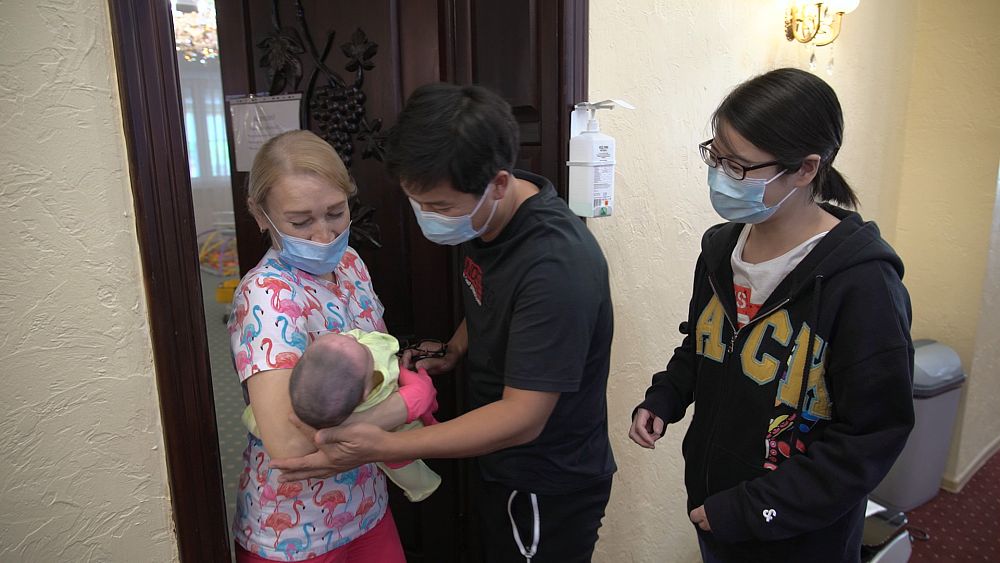Ukraine: the European surrogacy hub
The video was shot by Biotex Com, Ukraine’s leading medically-assisted reproduction services agency. It showed dozens of babies in rows of cots in Kyiv, born to surrogate mothers in Ukraine.
Because of COVID-19 travel restrictions, their parents, who were mainly based in different countries around the world – could not collect them for weeks and in some cases even months.
The agency registers more than 300 births per year; would-be surrogates apply every day.
Although its critics dismiss it as a baby factory, the company’s owner Albert Tochilovsky, who has faced several judicial investigations, is unrepentant:
“Whole countries had banned in vitro fertilisation. And now they say that by 2025, every third child will be born from a test tube.
“We’re entering the post-industrial economy. Surrogacy, chips connected to the brain: this is the future.
“Some couples choose the baby’s sex. It’s forbidden in many countries in the European Union but here, we have no limits.
“We hope that the law will allow improved technology, like CRISPR to choose the colour of the eyes or other certain qualities of the child.”
Surrogacy is strictly prohibited in eight European countries, although it’s tolerated in some others simply because of the current lack of relevant laws. It’s legal in the United Kingdom and Greece as long as it’s done on a non-commercial basis. Ukraine, along with Russia, is one of the few countries where commercial surrogacy is legal.
Less expensive than in the United States, the reference destination for the practice, international surrogacy in Ukraine has been gaining ground on the global market, estimated a some 5 billion euros. Over the past five years, more than 4,000 children were born via surrogacy in Ukraine, 90% of them to foreign parents.
‘Rights violation’
Mykola Kuleba, Ukraine’s Commissioner of the President of Ukraine on the rights of the child, is concerned that the situation violates the rights of surrogate mothers as well as children:
“Ukraine has become a supermarket for surrogacy.
“The child is already becoming a commodity, but a woman is an incubator that has to carry this product for someone.
“If during the pregnancy, the clients decide that they no longer want the child, the surrogate must have an abortion. If she doesn’t, all the funds must be returned.
“If she gives birth to the child and customers don’t want to take it away, she has to give the child to an orphanage, because she has no rights to it.”
Positive surrogacy experience
However, Olga Kicena, a surrogate mother from the Ukrainian city of Vinnitsya, tells a positive story of her experience.
A sports coach and body building champion, she acted as the surrogate for a Chinese couple, whose son she gave birth to in July.
She insists that she felt in no way exploited, and notes that the medical follow-up was impeccable.
Olga says surrogacy was a way for her to change her life and that of her 13-year-old daughter:
“I came to (surrogacy) in order to no longer live with my mother and to buy myself a small house. To do that, I would have had to (otherwise) work for a very long time, or go and work abroad.
“I didn’t want to leave my child behind with her grandmother or someone else, so I didn’t think about it for long and chose to enter a surrogacy programme.
“In the beginning, I did it for the money, it’s true.
“But once I was pregnant, I felt I was creating a family for someone. And my thoughts changed. Money is good, but giving someone life is even better. “
When asked if it had been difficult to part with the baby after carrying if for nine months, she has no hesitation:
“I understood from the start that the child should be given away.
“So there were no maternal feelings, emotions, throughout the pregnancy. I have my own child whom I love, and have emotions for.
There was only a sense of responsibility. That I have been carrying someone else’s child for 9 months, and that I need to pass it over. Of course it is very cute when you see this little baby, it’s very moving .. But I understood that this child was someone else’s. That he had a dad and mom. “
“My mom gave a new life, I think that’s great! It’s a positive thing for me, I’m proud of my mom”, adds her daughter Alisa, smiling.
The financial cost of surrogacy
French estate agents Celine and Maxence Roussel are one of many couples who have turned to Ukraine in their efforts to have a child via surrogacy. After discovering Celine’s infertility, the couple tried to have a child through assisted reproduction techniques for years and turned to surrogacy as a last resort. They took out a loan so that they could afford the total costs of between €60-70,000.
Maxence says it’s a much more rigorous process than some people seem to believe:
“Anyone who can imagine that whatever the situation, you just need to pay and that’s enough to get a child, that’s not it at all.
“It’s really not. You really have to have a real problem and medical reasons to be allowed to access surrogacy in Ukraine.”
Celine agrees:
“For (my husband) donating his sperm, there is a health check and for me, there needs to be a medical certificate proving that I am infertile and unable to bear a child.
“I get the impression that sometimes people think that someone’s child is stolen.
“This is completely false. Because although the surrogate mother bears the child, it’s in no way hers. She is not the mother in any way, because it is not her genetic heritage.”
“It’s either the eggs of the intended mother that are used when possible, or from a donor when a donor is needed. But it’s not (the surrogate’s) own eggs.
“For me, surrogacy is a technique like any other. There are women who are born without a uterus, or with serious uterine abnormalities.
“Why should they be penalised, when other couples or women who have problems with the quality of eggs, or men who have problems with the quality of sperm, can be helped?”
But the opponents of the trade insist that it is exploitative and are uncomfortable with what they see as a challenge to traditional parenthood.
Frydman rejects surrogacy
Professor René Frydman, France’s most famous gynaecologist, is among those opponents. He oversaw the first child born in France via in vitro fertilisation nearly four decades ago and also fought for the rights of single women and lesbian couples to access medically-assisted reproduction.
But he believes that surrogacy is a red line that shouldn’t have been crossed:
“For someone like me who has carried out thousands of deliveries, the person who gives birth is the mother.
“And when you get into a trading system, it means an organisation, intermediaries – and exploitation.
“So I prefer to focus my efforts on improving assisted reproduction techniques and medical research, so that there is less infertility.
Professor Frydman says science cannot and should not solve everything:
“You can’t overvalue genetics. We don’t always have the answer and we cant provide answers to everyone, beyond all principles.
“There are 40% of couples who come to us who will never have the child that they so desire.
“We must also accept that we can’t just do anything at any cost.
“Research is ongoing, for example, we are developing uterus transplantation.
“It won’t be a solution for everyone It’s complicated. Where does the uterus come from? Who donates it? All this is not easy, but at least, there is no business involved. “
Bioethics bill ban
In the recently-passed French bioethics bill, there is no rehaul of the ban on surrogacy in the country. But an amendment confirmed the obligation for what are referred to as ‘parents of intent’, who have no biological link with their child born via surrogacy abroad, to go through an adoption procedure to become legal parents.
Sylvie and Dominique Mennesson fought for 19 years to be recognised as the legal parents of their twin daughters, born through surrogacy in the United States. Their children’s American birth certificate was not recognised by French courts, because Sylvie, who suffered from infertility, resorted to egg donation.
Sylvie regards this as discriminatory:
“To say that the only possible mother is the one who gives birth, is going back centuries.
It’s making childbirth sacred, to the detriment of raising children, wanting children, being at the birth, being what is called the intended mother. And that for us was not acceptable.”
It took years of legal proceedings, and a ruling against France by the European Court of Human Rights, for the country’s highest French court to finally acknowledge the couple as legal parents.
Ghost children of the Republic
Dozens of so-called intended parents have since benefited from the full transcription of the birth certificates of their children born abroad via surrogacy, but the new bill of law might make adoption compulsory again.
“It’s an attempt make to punish the children”, says Dominique, “to make people believe that it will prevent people from going abroad.
“They think it’s a deterrent”, adds Sylvie. “In fact, it’s not at all discouraging since people, when they want children, are ready to climb over mountains and cliffs, they will do anything for that.
What matters are the children’s rights. It is not normal that they are discriminated against.
Our children have been called the ghost children for years, the ghosts of the Republic.
They were here, but they were not, and they did not exist anywhere in the records.
And that makes everyday life complicated.”
Giving surrogacy a legal framework which could protect all involved parties is the aim of a large group of French signatories in a joint appeal.
One of them is Genevieve Delaisi de Parseval, a psychoanalyst and bioethics expert.
She says the traditional model of parenthood must be reconsidered:
“Our society is constantly changing. Yet, there is a block on procreation.
“We must help our contemporaries so that these children are born in the best possible conditions.
“I believe that what matters to a child is that it is wanted, that it is respected as an individual. And that everyone involved is respected, including the surrogates.
“There should be no confusion between reproductive cells and the human subject. The psychoanalyst doesn’t care about reproductive cells. It is the human subject that matters most. “
Andrea and Gianni’s happy ending
In Italy, surrogacy is also prohibited. That has meant a complicated journey for one gay couple, Andrea Simone and Gianni Tofanelli who live in Milan with 6 year old daughter, Anna.
Andrea and Gianni married in the United States in 2013, before civil unions were allowed in their home country. It was in the US that they were able to start a family, through surrogacy.
Andrea says it was the realisation of their dream to have a family:
“If someone asked me what was the most beautiful day of my life, I would say the second of august 2014, when she was born.
“Finally, we fulfilled our dream of becoming a fully-fledged family.”
It took a year of legal battles for Andrea and Gianni to get their daughter’s US birth certificate transcribed, recognising them both as Anna’s legal parents in 2018.
Gianni says that, despite their happy ending, he realises there are families who weren’t as lucky:
“There are still rulings that are being reviewed by the European Court of Human Rights, because situations like ours are frozen at the moment.
“That means there are children who have two parents in real life, in their social life, in the eyes of their schoolmates, of the neighbours, of everyone – but they are not legally recognised.
“What I also want to point out is that children like ours are very much desired. Of course children born naturally can also be loved in the same way.
“But our children are born out of a very strong choice, which is confirmed day after day. There’s no doubt, the strength of feeling, the dedication is maximum.”
Anna knows her family backstory well, but one day she will be able to read a book Andrea wrote about their experience, entitled ‘Two Men And A Cradle’
Andrea says he wrote it to make mindsets change, but most of all, so Anna would one day have all the information about her origins, and the first 6 years of her family’s life.
“I want her to one day be able to read and understand her story.”
I think the most important thing is to convey her as much love as possible. The most important message we want to get through, is that our family is full of love.”








